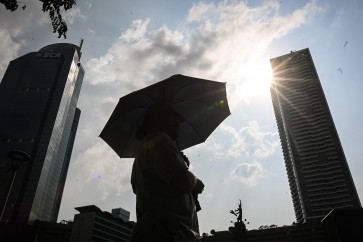Popular Reads
Top Results
Can't find what you're looking for?
View all search resultsPopular Reads
Top Results
Can't find what you're looking for?
View all search resultsProgress and challenges of Indonesian haj management
For Indonesia, haj management and administration is a national duty since it involves more than 200,000 pilgrims traveling to Saudi Arabia every year to perform the haj in a peaceful and safe manner
Change text size
Gift Premium Articles
to Anyone
F
or Indonesia, haj management and administration is a national duty since it involves more than 200,000 pilgrims traveling to Saudi Arabia every year to perform the haj in a peaceful and safe manner.
Improvement of the services and protection of all pilgrims is meant to ensure the best quality of mabrur (performed in a manner pleasing to Allah). To reach this objective, a positive atmosphere is needed during the running of the haj so that the administrators are able to arrange education, constructive services and protection for the pilgrims during the ritual. The custom promotes guidance, education, counseling and information. Services consist of registration, financing, transportation, healthcare, meals and accommodation. Protection covers safety, security and protection from crimes.
Indonesia has the largest number of pilgrims in the world. In 2012, Indonesia's Muslim population reached 220 million with haj quota reaching 211,000. Out of the total number, 194,000 of them registered for the standard program while the remaining 17,000 opted for premium services. The standard pilgrimage is managed by the state with assistance from local governments, while the premium package is organized through private haj travel or tour operators.
Indonesian haj pilgrims travel from 12 locations to airports in Jeddah or Medina with a flying time of up to 12 hours. However, because the pilgrims come from all parts of Indonesia, they require a range of alternative local transport services by land, sea and air. Some pilgrims need more than eight hours to reach their point of embarkation. Given the traveling distance, a haj dormitory is required for the pilgrims to transit and to provide clearance of their documentation.
The cost of regular haj package in 2013 is around US$5,350, with $3,527 paid as a deposit. The premium package will costs at least $8,000 this year.
On average, the waiting time for Indonesians who go to haj in 2012 was around 11 years. The long wait, along with improvement in the management of the haj funds, has increased the funds to a tune of $5.6 billion in March 2013. The funds are invested in Islamic banks and government Islamic bond sukuk.
We are now preparing to utilize the funds for direct investments that will provide higher benefits to the pilgrims, including purchasing aircrafts specifically for use in the pilgrimage.
The total cost will include airfare plus tax (46 percent of total cost), accommodation (30 percent) and daily living cost (9 percent), while other services account for 15 percent of total cost.
Main administration costs, such as salary for public servants, IT investment, offices, part-time haj officials and other operational support services, are covered by the state and local governments.
The number of Muslims embarking on minor pilgrimages or umrah has significantly been on the rise. Last year more than 350,000 conducted umrah, while this year the number could reach 500,000.
The minor pilgrimage is managed by private haj and umrah tour operators. There are around 250 licensed haj and umrah tour operators. The cost of umrah varies, depending on specific services on offer. The Directorate General of Haj sets the minimum level of services and requires the operators to submit reports.
To maintain quality services, good governance and performance, the haj and umrah administration is supervised by many foreign oversight institutions. The highest supervisory body, the Indonesian Haj Supervisory Commission (KPHI), was just established through a presidential decree.
Supervision of the haj funds and performance is conducted by the internal auditors within the Religious Affairs Ministry, and by the external auditors from the Supreme Audit Body (BPK), not to mention control from the Corruption Eradication Commission (KPK).
___________________
On average, the waiting time for Indonesians who go to haj in 2012 was around 11 years. The long wait, along with improvement in the management of the haj funds, has increased the funds to a tune of $5.6 billion in March 2013.
Significant increase in accumulated haj funds is also subject to public scrutiny and corruption watchdogs. Modern haj management requires good financial management, anti corruption measures, code of conduct, professional fund managers, treasurers and accountants to manage it. Reform of the management of the haj has begun together with development of information and technology.
Despite the improvement of policies made by the Kingdom of Saudi Arabia, some problems and challenges remain. The impediments include a significant increase in housing expenditure in Mecca, the quota issue and uncertainty with regards to the status of the haj mission office and labor affairs in Saudi Arabia.
In the last two years, due to the expansion of the Masjidil Haram area, some high rise buildings around there have been demolished, leading to a rise in housing rent. The average rise of 15 percent in the last two years is neither fair nor appropriate for the pilgrims.
We have offered collaborative action with other haj missions and requested the Saudi government to stabilize the housing rent for pilgrimes in Mecca.
Increasing the quota for Indonesian pilgrims is important but at the same time the rise of non-quota pilgrims is also quite alarming. We expect closer cooperation with Saudi Arabia control number of non-quota pilgrims. Our request for a bigger quota of may be accommodated once expansion of the Haram mosque in Mecca is completed.
With regards to the change in status of haj mission offices and new regulations enforced in Saudi Arabia, their implications to the management of pilgrims need to be addressed. The consequences for us are not negligible but the additional funding needed for car rentals, ambulances and additional seasonal workers are very high. We have proposed gradual and selective implementations.
In summary, Indonesia would like to continue cooperation with the Kingdom of Saudi Arabia and other haj missions around the world. We look forward to improving the pilgrimage management and to cooperate with Saudi Arabia particularly in the three areas as part of the efforts to improve services for haj and umrah pilgrims.
The writer is director general of the haj and umrah at the Religious Affairs Ministry. The article was an abridged version of his paper presented at the World Haj and Umrah Convention, on May 21-22 in London.










